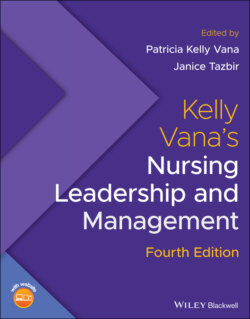Читать книгу Kelly Vana's Nursing Leadership and Management - Группа авторов - Страница 219
Real World Interview
ОглавлениеWhen nursing staff is asked the question “what can leadership improve upon?”, the answer is often related to communication and education with respect to change. While safe staffing ratios are vitally important, adverse safety events and job dissatisfaction may come from implementing a new process, device, or expectations without properly notifying or educating staff. Providing up‐to‐date information—even laying the framework to changes or potential concerns coming in the future, can help nurses adapt to and implement changes quickly.
We love our unit newsletter because it allows us to look at where we are and where we are going while always keeping safety in the front of our minds. It is a collaborative effort between the educators, management, infection control, and various other departments (like pharmacy and the vascular team). Fun articles celebrating employee birthdays, anniversaries, and humor segments along with unit pride pieces help make the newsletter fun to read as well as educational. Creating a graph of catheter‐associated urinary tract infections (CAUTI) rates has been largely unsuccessful in convincing nurses of the importance of HAIs. Writing a short article on the number of CAUTIs the hospital has had for the month and on which units they occurred gets everybody talking about the problem. It's a different spin on the same material. The hope is that in combination with staff meetings, education sessions, huddle alerts, updated intranet splash pages, and other communication strategies, we are bombarding our staff with information to keep their patients—and themselves—SAFE. When we are consistently safe, we improve patient outcomes and nurses are more engaged in their work and their hospital.
Bonny Dieter, MS, RN, CMSRN
Clinical Leader and Creator of PMU Newsletter
Pulmonary Medicine Unit
Edward Hospital
Naperville, IL Figures and
FIGURE 4.4 PMU Newsletter. Newsletter designed to increase communication on safety issues.
Source: Bonny Dieter.
